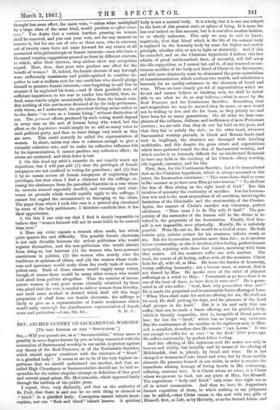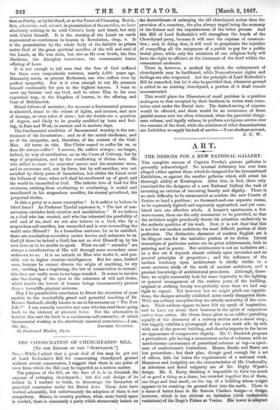REV. ARCHER GURNEY ON SACRAMENTAL WORSHIP. ri0 THE EDITOR OF
THE " SPECTATOR.")
Stn,—Will you permit me; as a " Sacramentalist," whose name is possibly in some degree known by you as being connected with the restoration of Sacramental worship in our midst, to protest against any theory of the Real Presence, or of the Eucharistic Sacrifice, which should appear consistent with the existence of " blood " in a glorified body ? It seems to me to be of the very highest im- portance that we should understand one another, and that so- called High Churchmen or Sacramentalists should not be held re- sponsible for the rather singular attempt at definition of that good and earnest papal priest, Mr. McConnochie, which appeared lately through the medium of the public press.
I repeat, then, very distinctly, and that on the authority of St. Paul, that there is and can be no such thing or element as "blood " in a glorified body. Corruption cannot inherit incor- ruption, nor can " flesh and blood" inherit heaven. A spiritual body is not a natural body. It is a body, but it is not one subject to the laws of this present state or sphere of being. It is none the less real indeed on this account, but it is real after another fashion, to us wholly unknown. This only we may be said to know, negatively, that that blood which is the life of the natural body is replaced in the heavenly body by some far higher and nobler principle, whether akin or not to light or electricity. And if this be conceded, and on the Christian hypothesis I believe this fact admits of proof mathematical, then, of necessity, will fall away
the idle supposition, as I cannot but call it, of any renewed or con- tinuous sacrifice of the body and blood of Christ in the Sacrament; and still more absolutely must be eliminated the gross materialism of transubstantiation, which confuses two worlds, and substitutes a heavenly for an earthly substance in the elements of bread and wine. When we have clearly got rid of impossibilities which we do not and cannot believe as thinking men, we shall be better
able to see what we do or may believe, —what is meant by the Real Presence and the Continuous Sacrifice. Something vital
and stupendous we may be assured they do mean, or men would not be willing to live and die for them, as they plainly are and have been for so many generations. On all sides we hear com- plaints of the coldness, dullness, and inefficiency of more Protestant services ; we are told that they do not lay hold on the poor, and that they fail to satisfy the rich ; on the other hand, wherever Sacramental worship prevails, in Greek and Roman lands (and now in Anglican), the churches are thronged with kneeling multitudes, and this despite the gross errors and superstitions which have gathered round the idea of Sacramental worship, and which render it so intensely difficult for an intellectual Romanist to have any faith in the teaching of his Church—Mary-worship, idle legends, casuistry, and the like.
First, then, for the Continuous Sacrifice. Let it •be remembered that on the Christian hypothesis, which is always assumed in this letter, the Incarnation continues : " This same Jesus shall so come
in like manner as ye have seen Him go into heaven." " Ye shall see the Son of Man sitting on the right hand of God." But this
involves of necessity the continuity of sacrifice. • For the Incarna- tion was and is the most stupendous of all sacrifices, involving the limitation of the Illimitable and the creatureship of the Creator.
Again, the essence of Christ's sacrifice was voluntary, perfect obedience. " Then came I to do Thy will, 0 God l" The per- petuity of the surrender of the human will to the divine is in- volved in the perpetuity of the Incarnation. Finally, God him-
self is not impassible, save physically. Morally, He is infinitely passible. Were He not so, He would be a God of stone. He feels
infinite pity, infinite sorrow for his creatures, infinite wrath at
sin. But the Incarnation involves more than this ; as it involves fellow creatureship, so also it involves fellow feeling, perfect human
sympathy, rejoicing with those that rejoice, mourning with those that mourn. All the members suffer one with another. The head, the centre of all feeling, suffers with all the members. Christ
feels for all, with all, as Man. He bears the burden of humanity,
weary, suffering humanity ; not a human want, or sorrow, that is not shared by Him. He speaks even of the relief of physical sufferings as a relief to Him : " Forasmuch as ye have done it to one of the least of these, ye have done it unto me?" He is perse- cuted in all who suffer : "Saul, Saul, why persecutest thou me?"
He is made the perpetual and inconsumable burnt offering of Love.
" When Thou shalt make his soul an offering for sin, He shall see his seed, He shall prolong his days, and the pleasure of the Lord shall prosper in his hand." But it is his soul only that can suffer, that can be made a burnt offering, not his glorified body, which is literally impassible, that is, incapable of literal pain or
loss ; far less his " blood," which has no longer any existence. But the continuance of the sacrifice in his righteous soul, in Him- self, is manifest, therefore does Ile remain " THE Lams." It was not enough to suffer for us once " in the flesh" 1800 years ago. He suffers continually, by perfect fellow feeling.
And this offering of His righteous soul He makes not only in heaven and visibly, but invisibly and by means of the offering of Melchizedek, that is, plainly, by bread and wine. He is not changed or transmuted into bread and wine, but by these earthly elements He presents himself in our midst, in order to receive the immediate adoring homage of loving hearts in His redeeming, suffering, constant love. It is Christ whom we adore, it is Christ whom we present to God, not any parts of Him, but Himself. The expressions " body and blood" only come into right use at all in actual communion. And then we have St. Augustine's famous exposition of them, to which nothing in my judgment can be added,—that Christ comes to the soul with two gifts of Himself, first, as Life, as by His body, or as the Second Adam ; and then as Purity, as byhis blood, or as the Fount of Cleansing. But in, first, adoration, and, second, in presentation of the sacrifice, we have absolutely nothing to do with Christ's body and blood, but only with Christ himself. It is the worship of the Lamb on earth represented as continuous in heaven in Revelation, chap. v. It is the presentation by the whole body of the faithful as priests under God of the great spiritual sacrifice of the will and soul of the Lamb, as He was slain, but also as He ever liveth, the One Mediator, the Almighty intercessor, the consummate burnt offering of Love.
It is not enough to tell men that the Son of God suffered for them even unspeakable tortures, nearly 2,000 years ago. Humanity needs, as present Redeemer, one who suffers ever by perfect sympathy. Nor is it even enough to say He presents himself continually for you in the highest heaven. I want to meet my Saviour and my God, and to adore Him in his own appointed way, in the kingdom of heaven, in the offering and feast of Melchizedek.
Ritual follows of necessity, the moment a Sacramental presence is admitted, ritual to the extent of lights, and incense, and acts of homage, or even robes of state ; but the details are a question of degree, and likely to be greatly modified by taste and feel- ing, in East and West, in ancient and in modern days.
The fundamental condition of Sacramental worship is the con- tinuance of the Incarnation ; and so of the moral obedience, and so of the sympathy, and, therefore, of the sorrow of the God- Man. All turns on this. Has Christ ceased to suffer for us, or does He always suffer ? I answer, He suffers always ; no longer, indeed, by way of satisfaction, as on the Cross of Calvary, but by way of propitiation, and by the overflowing of divine love. He who willed to share his creatures' nature and his creatures' woes, and to overcome evil, not by force, but by self-sacrifice, was not satisfied by thirty years of immolation, but abides the Lamb until the fullness of time, when evil shall be swallowed up of good, and the world be reconciled to God. The infinite love of God for His creatures, existing from everlasting to everlasting, is sealed and manifested in his stupendous sacrifice, his eternal priesthood, his perpetual victim.
Is this a petty or a mean conception ? Is it nobler to believe in blind force? As Professor Tyndal expresses it, " The law of con- servation excludes both creation and annihilation." If we believe in a God who has created, and who has tolerated the possibility of evil and of sin, shall we not also believe in a God, who by a stupendous self-sacrifice, has reconciled and is ever reconciling the world unto Himself ? In a boundless universe, let us be satisfied, there are numberless secondary causes known and unknown to us. God (if there be indeed a God) has not so shut Himself up by his own laws as to be unable to speak. What we call " miracles" are always a manifestation of His will through some secondary cause unknown to us. It is no miracle to Him who works it, and pos- sibly not to higher creature-intelligences. But for man, limited man, because he cannot discern the origin of anything, to cry out, ' nothing has a beginning, the law of conservation is eternal,' this does not really seem to me large-minded. It seems to involve also the closing of the eyes to the existence of will and choice, which render the lowest of human beings immeasurably greater than a bound163.5 physical universe.
May I be permitted in conclusion to direct the attention of your readers to the wonderfully grand and powerful teaching of Dr. Horace Bushnell, chiefly known to me in his sermons on " The New Life?" I can scarcely conceive any man who has read these going back to the idolatry of physical force. But the alternative is betwixt this and the faith in a continuous self-surrender, of which Sacramental worship is the absolutely essential correlative.—I am,































 Previous page
Previous page